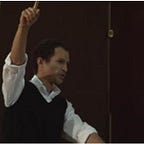Thoughts on the crimes and crucifixion of the minister of education
Feelings… I suppose they also have a place in the political debate. They tend to assert themselves forcefully anyway, regardless of what we may think is good and proper at the time. So I thought it may be worthwhile to probe my feelings on this matter a bit to get to the source of my discontent.
I’ve been following the trial of Minister Katrina Hanse-Himarwa closely and listened to the verdict yesterday. At the end of it, I just felt overwhelmingly sad about it all. Disappointed. Some might say those are not the right feelings to be having, but I struggle to convince my feelings that they are wrong, that they are politically incorrect and should leave me in peace.
I certainly expected the court to find the minister guilty, because the evidence pointed that way, but I still didn’t feel happy about it — as some people seemed to. She certainly did wrong and that must be checked, but I felt there was some injustice in it.
After all, by favouring friends and family she was only doing as all her comrades in the party have been doing all along. The abuse of power is after all central to the history of their party and is integral to its political culture.
But at the end of the day, though, she was the only minister that the ACC has prosecuted to date. Many people have asked why the Prosecutor General has declined for so long — despite millions of dollars spent on investigations — to prosecute high-profile cases, such as the missing N$660 million GIPF case.
At a distance this looks like ‘selective prosecution’.
While the media have behaved like drought-ravaged vultures feasting on fresh carrion, the self-congratulatory mood of the partisan press leads me to think that the public crucifixion of Hanse-Himarwa cannot be properly understood outside the context of the ongoing struggle between factions inside the ruling party, including its gender and ethnic dimensions.
At any rate, the lesson to take away is that the minister overstepped the bounds of her legal authority and broke the law; she further lied to the court to conceal a meeting she convened to make changes to the housing list. And this premeditated lie that she and her high-priced lawyers presented to court will surely be a decisive factor in sentencing — and in her political legacy.
Ultimately, as for the students under her ministry, it may be that as minister of education the most important and somewhat tragic lesson of her tenure is that lies are terrible things that can have painful and ruinous consequences. Lies can lead to the ruin of a person, a family, even a whole country.
So yes, I was disappointed that she could not summon the courage to tell the truth. That would have somewhat redeemed her in my view and that of many others. She sought to defeat the truth, but ultimately the truth triumphed. I couldn’t help but think of her family, of her ruined reputation, of her career in tatters.
But I ask myself, how many of us — if we were in a position of power — would resist the temptation to reward our loved ones and punish our enemies? I may be wrong, but I believe very few will pass that test.
One does not need to condone corruption to have compassion for someone who has done wrong. It is easier to have compassion for someone if we can imagine ourselves in their position. So, let us think before we throw stones.
What is justice? If we punish one corrupt politician and leave the others untouched, is that justice?
Surely justice must be done in this case, but justice is also not retribution, it does not demand an eye for an eye, it is not vengeance either, but must restore the balance, and therefore must be tempered with an element of mercy, with a view to human frailty and weakness.
It doesn’t make sense to celebrate someone’s downfall, unless they personally did us harm. Let us rather make a fair and balanced appraisal of the minister’s role and that of her comrades in bringing the whole country to ruin, and what must be done to rescue it.
Our task is not to denigrate the fallen or to revel in their misery, but to challenge the system itself that corrupts the souls of men and women and that would turn us all against each other in a perpetual struggle of all against all.
In forming a wholesome judgment of this case, let’s not forget that nobody is totally beyond redemption, and if we are truly to arrest corruption in this country, there is much more work to be done.
